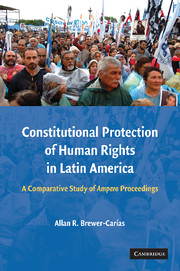 Constitutional Protection of Human Rights in Latin America
Constitutional Protection of Human Rights in Latin America Book contents
- Frontmatter
- Contents
- INTRODUCTION
- PART ONE THE CONSTITUTIONAL AND INTERNATIONAL DECLARATION OF HUMAN RIGHTS AND ITS JUDICIAL GUARANTIES
- PART TWO THE AMPARO AS A LATIN AMERICAN CONSTITUTIONAL AND INTERNATIONAL LAW INSTITUTION
- PART THREE THE INJURED PARTY AND THE CONSTITUTIONAL RIGHTS PROTECTED BY MEANS OF THE AMPARO PROCEEDING
- Chapter Nine The Injured Party: The Plaintiff and the Rules of Standing
- Chapter Ten The Justiciable Constitutional Rights by Means of the Amparo and Habeas Corpus Actions
- Chapter Eleven The Question of the Justiciability of Social Constitutional Rights by Means of the Amparo Actions
- PART FOUR THE INJURY, THE INJURING PARTY AND THE INJURING ACTS OR OMISSIONS IN THE AMPARO PROCEEDING
- PART FIVE THE EXTRAORDINARY CHARACTER OF THE AMPARO PROCEEDING
- CONCLUSION
- APPENDIX A List of Latin American Constitutions
- APPENDIX B List of Latin American Amparo Laws (Statutes)
- INDEX
Chapter Ten - The Justiciable Constitutional Rights by Means of the Amparo and Habeas Corpus Actions
Published online by Cambridge University Press: 08 August 2009
- Frontmatter
- Contents
- INTRODUCTION
- PART ONE THE CONSTITUTIONAL AND INTERNATIONAL DECLARATION OF HUMAN RIGHTS AND ITS JUDICIAL GUARANTIES
- PART TWO THE AMPARO AS A LATIN AMERICAN CONSTITUTIONAL AND INTERNATIONAL LAW INSTITUTION
- PART THREE THE INJURED PARTY AND THE CONSTITUTIONAL RIGHTS PROTECTED BY MEANS OF THE AMPARO PROCEEDING
- Chapter Nine The Injured Party: The Plaintiff and the Rules of Standing
- Chapter Ten The Justiciable Constitutional Rights by Means of the Amparo and Habeas Corpus Actions
- Chapter Eleven The Question of the Justiciability of Social Constitutional Rights by Means of the Amparo Actions
- PART FOUR THE INJURY, THE INJURING PARTY AND THE INJURING ACTS OR OMISSIONS IN THE AMPARO PROCEEDING
- PART FIVE THE EXTRAORDINARY CHARACTER OF THE AMPARO PROCEEDING
- CONCLUSION
- APPENDIX A List of Latin American Constitutions
- APPENDIX B List of Latin American Amparo Laws (Statutes)
- INDEX
Summary
CONSTITUTIONAL RIGHTS AND JUSTICIABILITY
As a matter of principle, not all personal rights are justiciables through the habeas corpus or amparo actions, which are only directed to protect those rights enshrined in the Constitution or those that have acquired constitutional rank and value; that is, those that even though also are regulated in statutes, they are out of reach from the Legislator in the sense that they cannot be eliminated, or diminished through statutes.
That is why the constitutional declarations of rights are so important for the Latin American systems of judicial protection of human rights, which have precisely originated the development of the amparo actions as a specific remedy for the protection of such rights in a different way to the United States injunction. In both cases they are extraordinary remedies, but contrary to the amparo that can only be filed for the protection of rights that have constitutional origin or rank, the injunctions are equitable remedies that can be filed for the protection of any kind of personal or property rights, even those of statutory or contractual origin, just provided that they cannot be effectively protected by ordinary common law courts.
In Latin America, on the contrary, rights that are only established in statutes and other lower rank regulations without constitutional foundations or that are not inherent to human beings, cannot be protected by means of amparo and habeas corpus actions, but only through the ordinary judicial remedies.
- Type
- Chapter
- Information
- Constitutional Protection of Human Rights in Latin AmericaA Comparative Study of Amparo Proceedings, pp. 212 - 239Publisher: Cambridge University PressPrint publication year: 2008


